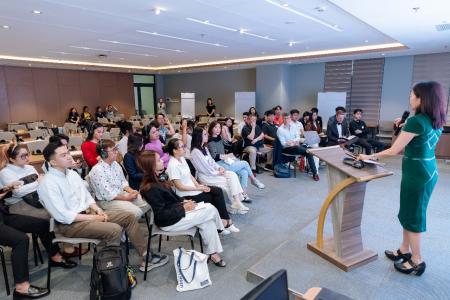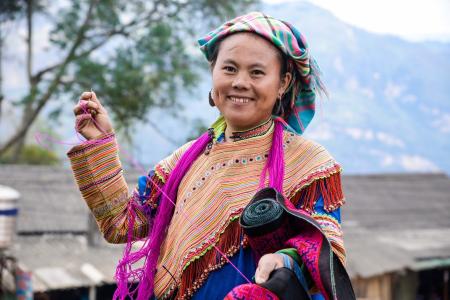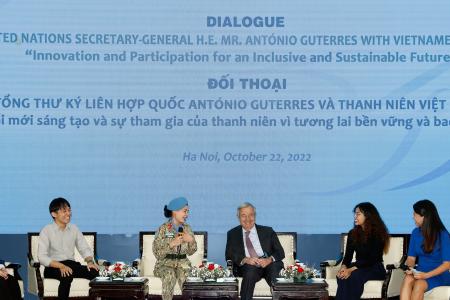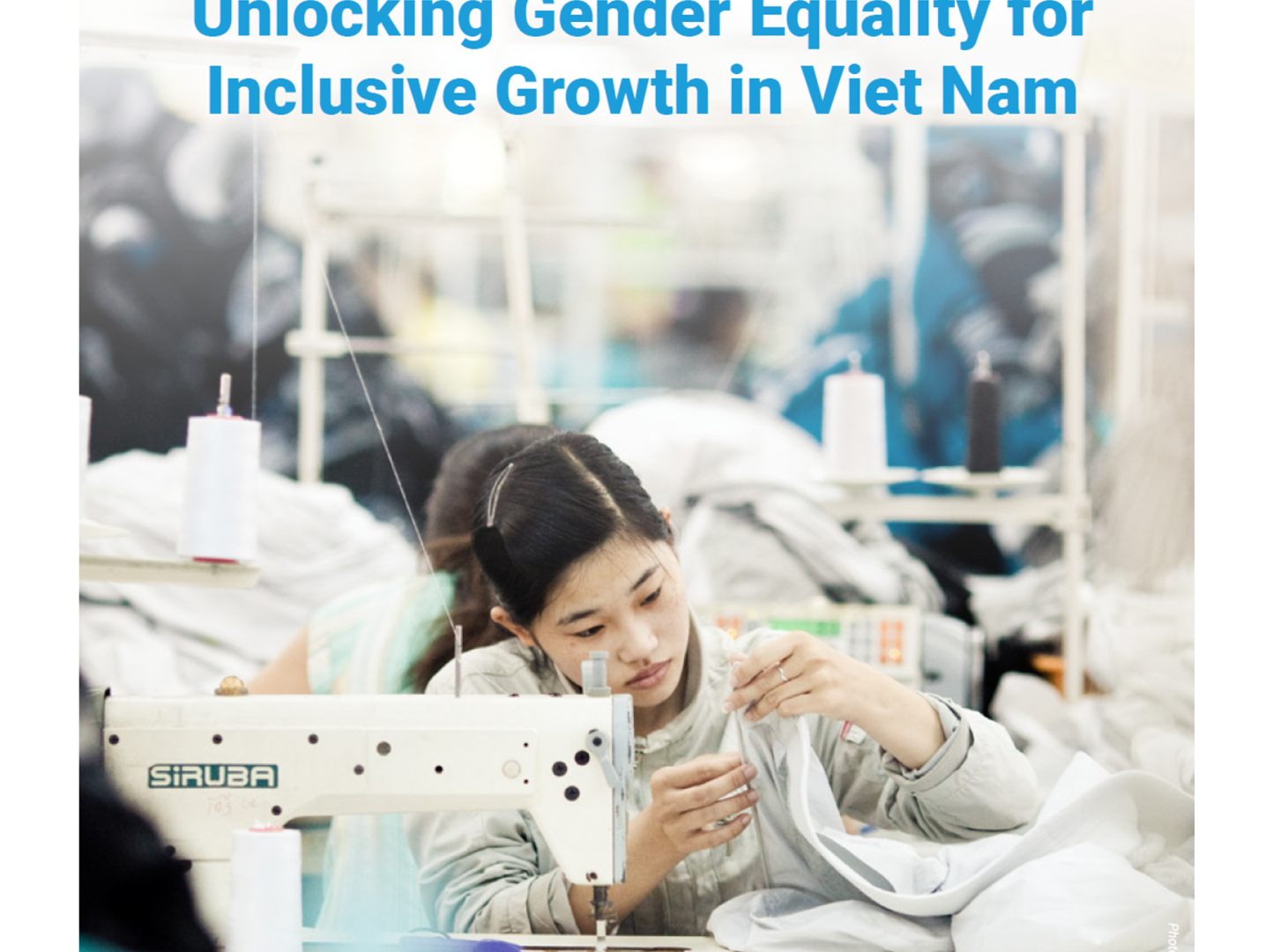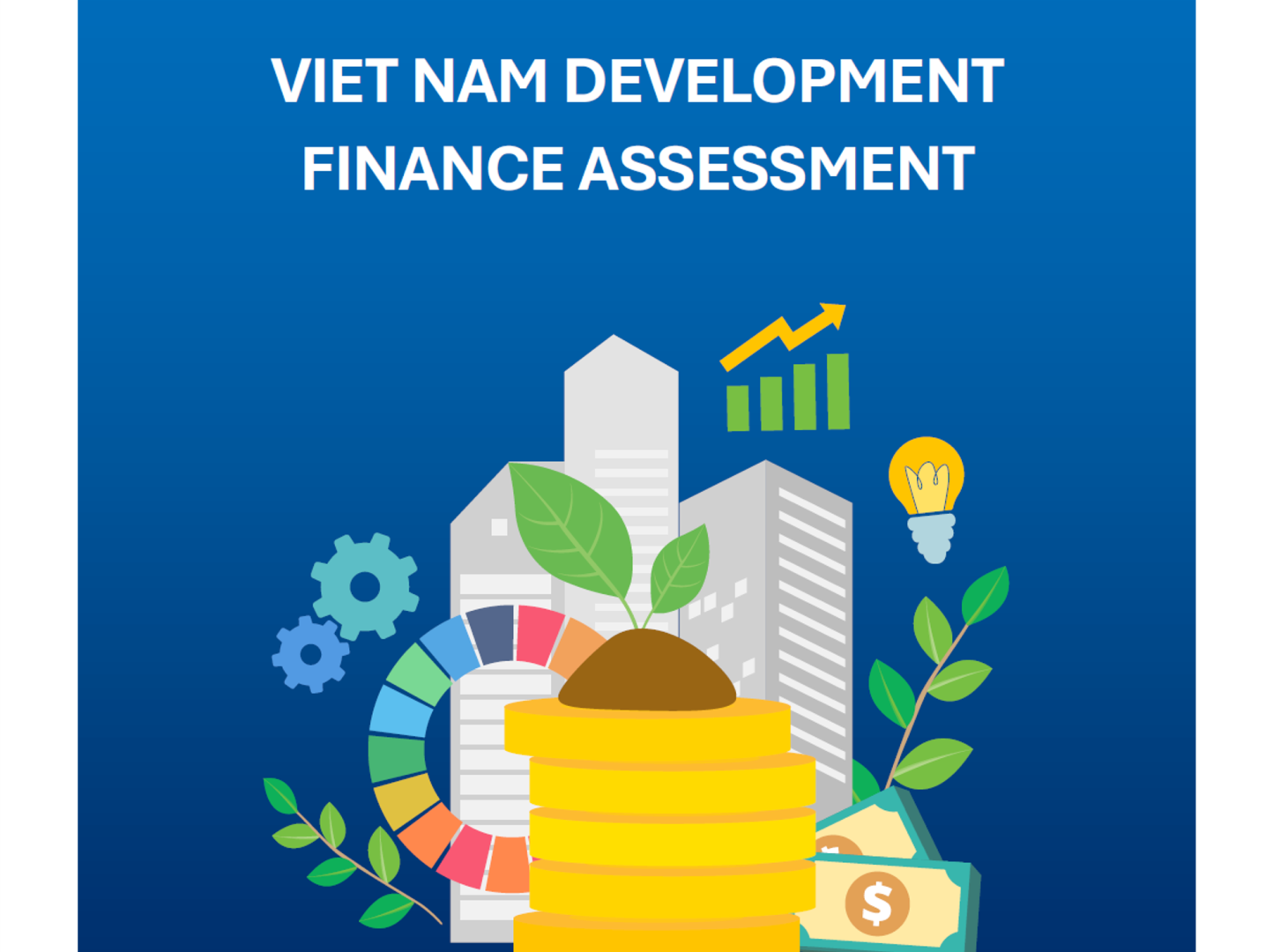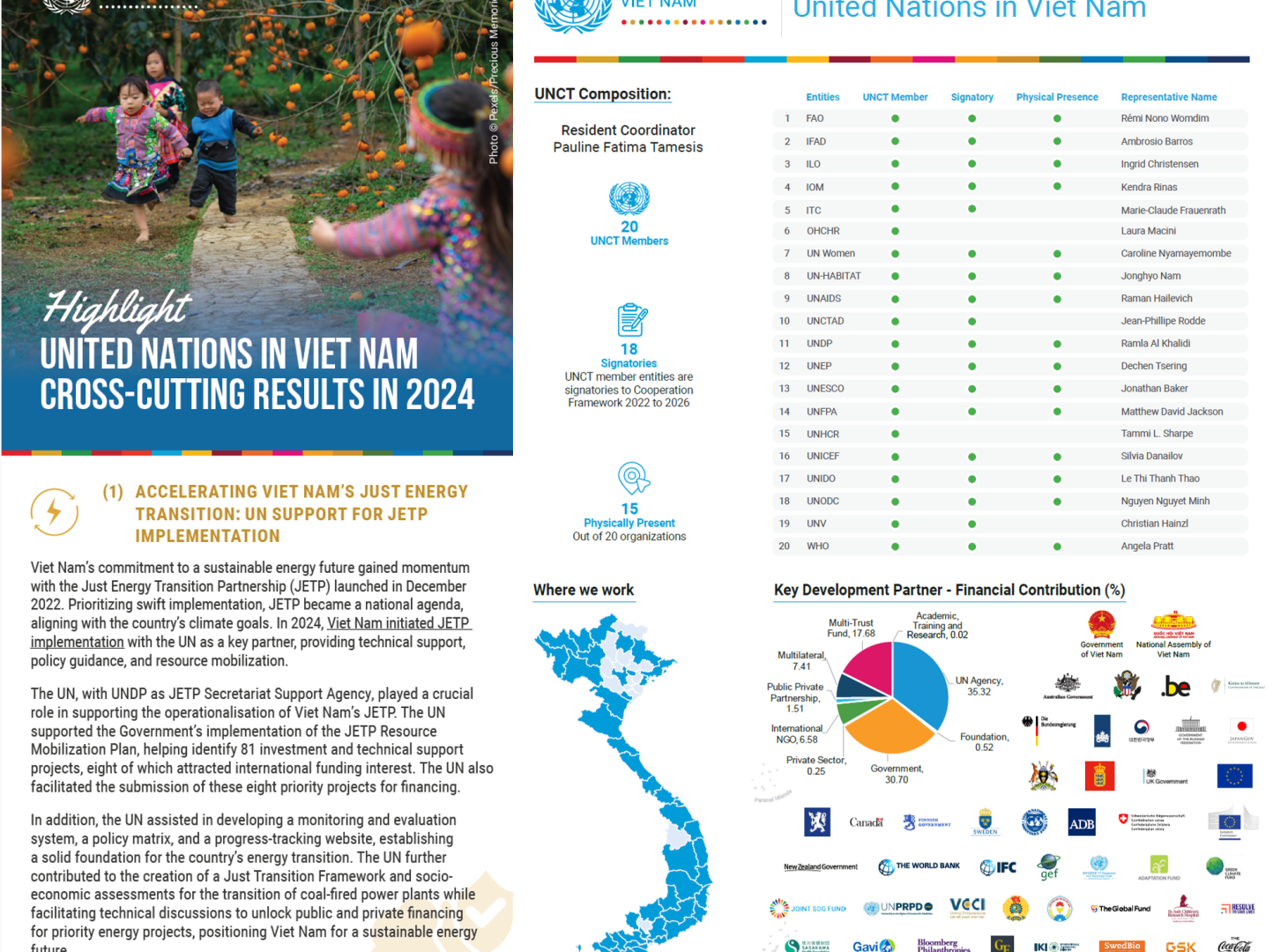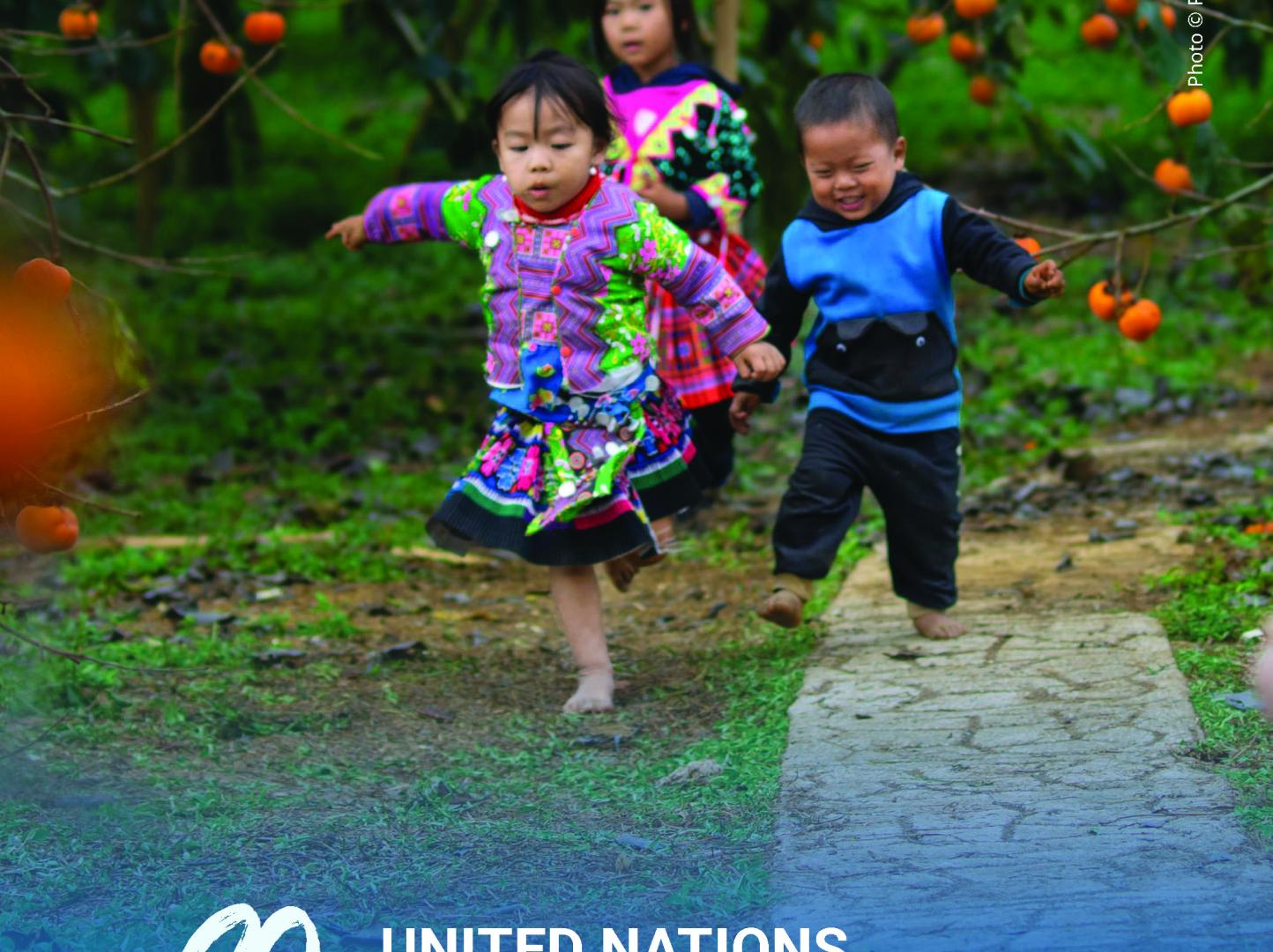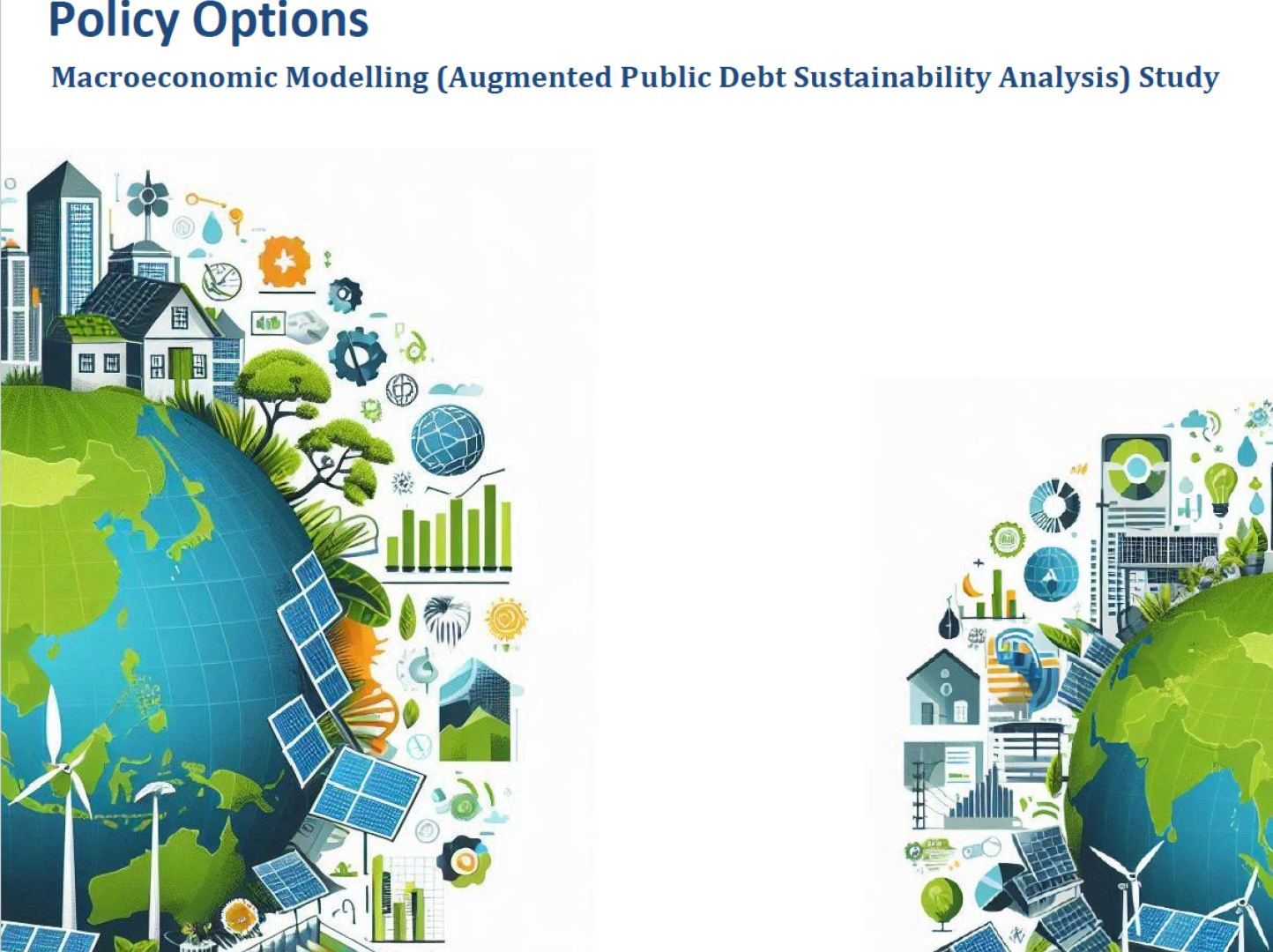Latest
Speech
30 June 2025
Workshop on Post-Typhoon Yagi Recovery Review and Strategic Planning for the 2025 Disaster Season by the Disaster Risk Reduction Partnership
Learn more
Story
12 June 2025
Building a climate-resilient Viet Nam: Strengthening women’s role in agriculture and leadership
Learn more
Press Release
28 May 2025
UN Women, UNICEF and UNFPA reaffirm commitment to support Ho Chi Minh City in providing essential services for women and children survivors of violence.
Learn more
Latest
The Sustainable Development Goals in Viet Nam
The Sustainable Development Goals are a global call to action to end poverty, protect the earth's environment and climate, and ensure that people everywhere can enjoy peace and prosperity. These are the goals the UN is working on in Viet Nam.
Publication
31 March 2025
2024 United Nations in Viet Nam Annual Results Report
The UN Viet Nam Annual Results Report 2024 highlights the UN Country Team's collective results in supporting Viet Nam’s acceleration of the SDGs and implementation of national development goals amid global transitions, economic shifts, and climate challenges. Three years into the UN Sustainable Development Cooperation Framework 2022-2026, the UN has provided policy expertise, international experience, capacity building, service delivery, humanitarian support, and resource mobilization. Looking ahead, the UN remains committed to fostering inclusive, sustainable development and resilience in Viet Nam., filtered_html
1 of 2
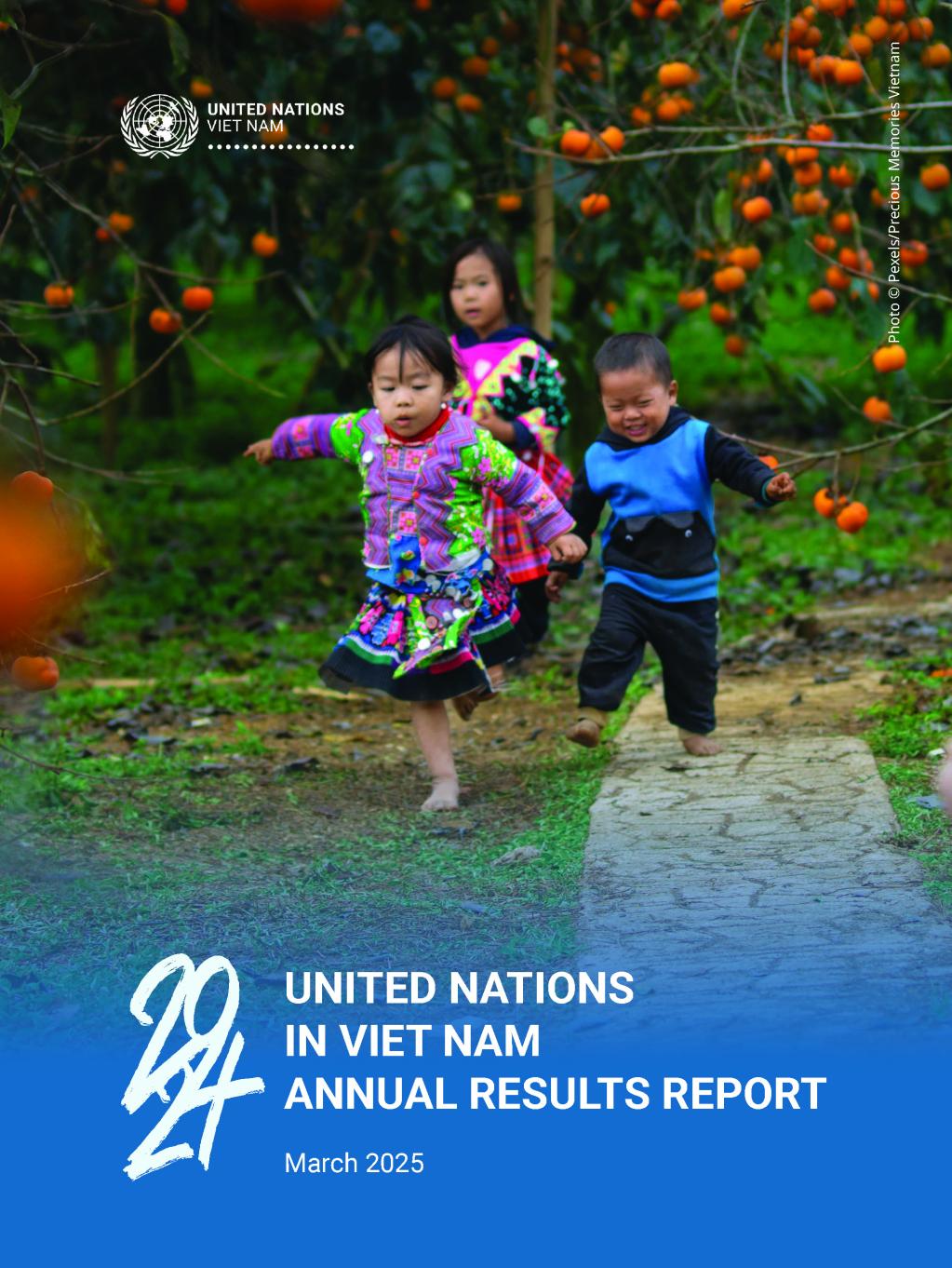
Publication
28 November 2022
One Strategic Framework for Sustainable Development 2022-2026
The Government of the Socialist Republic of Viet Nam and the United Nations system in Viet Nam present the One Strategic Framework for Sustainable Development Cooperation between the Government of Viet Nam and the United Nations for the period 2022–2026 (Cooperation Framework, or CF, for short). The Cooperation Framework is the United Nations central framework for planning and implementing development activities at the country level. It articulates the United Nations collective framework of support to Viet Nam towards achieving the Sustainable Development Goals and national development priorities.
The Cooperation Framework is a commitment between the Government of Viet Nam and the United Nations to work together, and in partnership with broader society (non-governmental organizations, academia, the private sector and other development partners). The goal is to contribute towards an increasingly resilient Viet Nam that embraces the wellbeing of all people – particularly the most disadvantaged, an inclusive green economy and people-centred governance systems, and where people enjoy equal rights and opportunities. At the core of the framework is our pledge to leave no one behind and to respond to the needs of the most vulnerable people in Viet Nam
, filtered_html
1 of 2
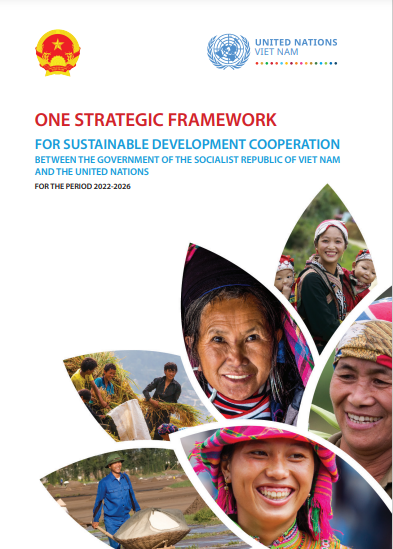
Story
12 June 2025
Building a climate-resilient Viet Nam: Strengthening women’s role in agriculture and leadership
As one of the most climate-vulnerable countries in the world, Viet Nam is facing an escalating climate crisis. Rising sea levels and increasingly severe disasters threaten not only its stunning landscapes but also the lives and livelihoods of millions of its people, from urban centers to mountainous regions and coastal areas. The Mekong Delta, a vital agricultural hub, exemplifies this vulnerability, grappling with drought, rising sea levels, and saltwater intrusion. Typhoon Yagi was yet another harsh reminder of Viet Nam’s growing battle against climate-related disasters. According to the Viet Nam Multi-Sector Assessment Report, the disaster caused extensive damage in 26 provinces, resulting in 320 deaths. The agricultural sector, which sustains many rural communities, was hit particularly hard, exacerbating economic hardships.Amidst these challenges, women are disproportionately affected. On a visit to Ca Mau in November 2024, Nguyen Thuy Huynh, a 39-year-old farmer from Khanh Binh Tay commune, shared: “I have to collect water to irrigate crops by hand. These tasks are time-consuming and exhausting, especially in the dry season.” In many rural households, access to clean water is a daily struggle, with women bearing the burden of managing limited supplies. Additionally, restricted access to financial resources, technology, and land ownership makes it harder for them to sustain agricultural livelihoods.The reality in Ca Mau is mirrored in rural areas throughout Viet Nam. Women play a crucial role in agriculture, a sector highly vulnerable to climate change. According to the Viet Nam Household Living Standards Survey, 63% of rural women are engaged in farming, compared to 58% of men. Among ethnic minorities, where 81% of the population works in agriculture, women form a significant portion of the workforce. Yet, they often lack the resources to recover from climate-related shocks such as floods, droughts, and water scarcity, which threaten their livelihoods. Strengthening women’s agricultural resilience through training, credit access, and sustainable farming techniques is essential for food security and economic stability. Viet Nam has strong policies supporting women farmers, but these require better resourcing and ensuring women’s inclusion in decision-making. Key international agreements, including the Beijing Declaration, the COP29 Resolution on Gender and Climate, and the Asia-Pacific Declaration on Gender Equality, emphasize addressing women’s unique challenges and ensuring they have a meaningful voice in climate adaptation efforts.UN Women in Viet Nam and Embassy of Japan in Viet Nam are working with the government to strengthen women’s resilience to climate change. With funding from the Japan, UN Women implemented the "Livelihood Support Project for Vulnerable Women in Ninh Thuan and Ca Mau Provinces Affected by Drought and Salinity" in 2024, taking an initiative to improve access to clean water for women and their children. Furthermore, Japan is collaborating with IOM and UNICEF to implement an initiative to provide essential water facilities in the northern mountainous region, including Cao Bang Provinces, which suffered significant damage from Typhoon "Yagi." UN Women through partnerships with Sweden, and New Zealand, initiatives in Lao Cai, and Da Nang are already delivering results. These efforts empower women by amplifying women’s voices in decision-making, providing climate-smart technologies and training, improving disaster planning through sex-disaggregated data, and integrating gender-based violence prevention. Women’s leadership remains central, with women’s unions driving and implementing key initiatives. Pi Nang Thi Thien, a 38-year-old single mother of two in Phuoc Chien commune, from Raglai minority group in Ninh Thuan province is one of the farmers who has benefited from ‘Water is Life’ project. The initiative by UN Women and Japan, implemented in Ninh Thuan and Ca Mau, provides water-saving irrigation equipment to help women manage their resources more efficiency. “I no longer worry about the high risk of losing my fruit garden due to drought. With the water-spraying irrigation system and pump provided by the project, I can now control the watering of my coconuts, jackfruits, banana, corn, and sugarcane”. This tangible improvement in the livelihoods of vulnerable women farmers like Ms. Pi Nang Thi Thien is a result of the strong leadership of Chamalea Thi Liem, a dedicated woman leader in her commune. Born in 1980, appointed chairwoman of the Commune People’s Committee in Ninh Thuan in 2021. She successfully advocated for the 'Water is Life' project, prioritizing its swift implementation by providing guidance and clear directions to designated local government staff. Her leadership ensured timely facilitation and support for water irrigation for women farmers. Additionally, her proficiency in both the local indigenous language of the Raglai minority group and Vietnamese enabled her to lead effectively and communicate the impactful results of the interventions, ultimately improving the lives of women and children in her commune.Their stories highlight how climate-resilient technologies are transforming the lives of women farmers, easing their workloads and safeguarding their livelihoods against climate change.As Viet Nam pursues its goals of becoming a high-income country by 2045 and achieving net-zero emissions by 2050, empowering women and girls must remain a priority. True resilience requires more than just climate-smart agriculture technology- it demands that women be fully involved in shaping climate adaption strategies. The Vietnamese government has announced its National Action Plan on Women, Peace and Security in 2024. Therefore, Viet Nam is at a significant milestone in promoting gender equality and women's empowerment in the field of peace and security. We are confident that the initiative by UN Women and Japan is a welcome development for Viet Nam as well. By investing in women’s agriculture livelihoods and leadership, we invest in a sustainable, climate-resilient future that aligns with Viet Nam’s long-term development ambitions.ITO Naoki is the Ambassador of Japan to Viet Nam, and Caroline Nyamayemombe is the UN Women Country Representative, filtered_html
1 of 5

Story
30 November 2024
Building a sustainable HIV response with the community, for the community
As international HIV funding began to fade in Viet Nam, community-based organizations (CBOs) have risen to the challenge, striving to ensure that community-driven solutions can not only survive but thrive. S Đỏ, a community organization based in Can Tho province, exemplifies this resilience, serving as a model for sustainability and innovation in Viet Nam’s evolving HIV response.A Turning PointFounded in 2012 by and for the MSM (Men who have Sex with Men) and transgender communities, S Đỏ began as a small initiative powered by international donor support to provide critical HIV testing, counseling, and outreach services to marginalized communities at higher risk of HIV infection.For years, Viet Nam’s HIV programs flourished with support from international donors like PEPFAR and the Global Fund. These resources have been funding vital services such as PrEP, self-testing kits, and most of community outreach work. But as Viet Nam transitions to upper-middle-income status, external donor funding is declining. This has left organizations like S Đỏ at a crossroads: adapt or risk losing the hard-won gains in their capacity and results against HIV.“When donor funding started to decrease, we had to make a choice: either shrink our work or find a way to sustain it ourselves,” says Đặng Quốc Phong, the non-binary leader of S Đỏ. “We’ve always believed that solutions should come from within the community. We chose to grow.”The Decision to DiversifyS Đỏ’s team began asking hard questions: How could they fund their work without relying solely on grants? What strengths could they leverage to create a sustainable future? They turned to the community itself for inspiration. Through their work, they noticed a pressing need for life skills, vocational training, and gender-sensitive counseling—and an opportunity to create a sustainable income stream. This realization led to the establishment of S Đỏ’s social enterprise arm, which offers capacity-building services like workshops on communication skills, consulting techniques, and media production. Clients range from international organizations like USAID and Save the Children International to local agencies like Can Tho Centers for Disease Control (Can Tho CDC) and Women’s Union branches, as well as community members seeking vocational support. “It was a win-win,” Phong says. “Our mission is always at the heart of what we do. We were building skills in the community and genuinely improve people’s lives while also funding our work.” Today, 30% of S Đỏ’s operational costs are covered by revenue from capacity-building services. The rest comes from a mix of short-term and long-term donor funding. S Đỏ reinvests its income into free HIV testing, mental health counseling, and outreach programs with separate specialized teams, ensuring that their services remain accessible to the marginalized population. Challenges Along the WayTransitioning to a self-sustaining model was not without its challenges. After years of operating as a grant-funded nonprofit, S Đỏ had to learn how to generate revenue while staying true to its mission.“At first, it was hard to see ourselves as more than just a nonprofit,” Phong admits. “We had to shift our mindset and embrace being a social enterprise.”There were also legal and financial complexities. Navigating tax regulations and government oversight required significant time and effort. “We spent a lot of time educating ourselves,”The Power of Collective ActionS Đỏ’s success is rooted in collaboration. As a founding member of the Mekong Delta CBO Network (MCN), S Đỏ has played a key role in strengthening connections among CBOs through technical advice, experience sharing, and capacity-building initiatives.In addition to local partnerships, S Đỏ works with international and national stakeholders like World Health Organizations and Viet Nam Administration of HIV/AIDS Control, as well as other international development partners. Acting as a trusted consultant, the organization helps design and implement programs tailored to the MSM and transgender communities, enhancing service quality and expanding outreach.“Our mission is bigger than us,” Phong reflects. “Through collaboration, we’re building a network that creates real, lasting change for the community.”Insights from the UNAIDS ConsultationS Đỏ’s transformation is part of a larger shift in Viet Nam’s HIV response. In August 2024, Phong joined other community leaders at a UNAIDS community consultation in Hanoi to discuss how CBOs can sustain their work in the face of declining donor funding.The consultation emphasized the critical role of CBOs in advancing the HIV response. Key community recommendations included fostering data transparency and collaboration between CBOs and health authorities, creating legal framework and mechanisms for state funding access, expanding community-led multi-service clinics, and ensuring clear policies to strengthen CBO roles in providing HIV and health services. Technical support to improve service quality and financial management was also highlighted.For Phong, the consultation was a moment of affirmation. “It was a reminder that we’re not alone in this work,” he says. “It showed us that our experiences and solutions are part of a larger movement.”A Vision for the FutureAs Viet Nam works to strengthen the sustainability of the national HIV response of which an important component is sustainability of the community-led response, S Đỏ is setting an example for how community organizations can lead with innovation, collaboration, and sustainability. UNAIDS Country Director, Raman Hailevich underscores the stakes: “If we fail to sustain community-led HIV responses, we risk losing the fight against HIV and failing the common goal of ending AIDS. Multilateral support is essential—the government, international organizations, and donors must continue supporting capacity enhancement and strengthen the enabling environment that fosters trust, provides resources, and empowers community organizations of people living with and at higher risk of HIV infection to grow and make greater, sustainable contributions to the HIV response. A sustainable HIV response must be built with the community, for the community, with the support of all stakeholders.”, filtered_html
1 of 5

Story
30 November 2024
Voices from the Transgender Community: “Respect is the foundation for accessible healthcare.”
"You make me so confused now. Are you male or female? Why do you look so different from your ID card?"These questions, asked by healthcare providers, are a stark reminder of the discrimination faced by transgender women in Viet Nam. For Tu Anh, a young transgender woman, and the community she represents, such encounters are still painfully not rare. Transgender people navigating the healthcare system often face not just stigma but deeply ingrained systemic barriers that hinder their access to healthcare services.Life as Transgender WomenTu Anh, a leader within the young HIV key populations community, is committed to creating positive changes. Born in the late 1990s in northern Viet Nam, she has grown up witnessing the struggles of transgender women, particularly those from northern provinces and ethnic minority groups. They are doubly marginalized, facing widespread societal prejudice and limited access to non-stigmatized health services.Living as their true selves—embracing an appearance that reflects their gender identity rather than their sex assigned at birth—subjects transgender people to heightened scrutiny and discrimination. This bias pervades every aspect of their lives, from securing decent employment to seeking medical care, societal recognition, and protection against gender-based violence. Challenges in securing stable jobs lead many to seek income through entertainment establishments or sex work as a means of survival, according to Tu Anh. Unfortunately, these precarious livelihoods expose them to significant risks, including gender-based violence (GBV), HIV, and other sexually transmitted infections (STIs). Financial hardship further compounds these challenges, pushing some toward higher-paying but unsafe practices, such as engaging in condomless sex, which significantly increases their vulnerability to HIV and other health risks."Economic struggles and societal stigma place transgender persons at risk for physical and sexual violence," Tu Anh says. "Many of us bear the scars of not being accepted, unable to express fully our true selves through our gender identity." SOGIE[1] Awareness in the Healthcare SettingsHealthcare settings, which should be safe havens for everyone, can become sources of stress and humiliation for transgender women. Medical professionals’ intrusive questions, such as those about gender identity or appearance, compound the healthcare access barriers. Additionally, the lack of gender-affirming documentation means that their identity often conflicts with what is recorded in official records, leading to refusal of services.“All we want is to be treated like anyone else,” says Tu Anh. In response, she has worked to create support networks within the transgender community, connecting people with clinics and healthcare providers who offer respectful, non-judgmental care. Additionally, the community has initiated HIV clinics specifically designed for transgender people and worked with the Viet Nam Administration of HIV/AIDS Control and development partners to provide SOGIE sensitization training where healthcare workers are trained to understand SOGIE and offer empathetic, non-judgmental care with confidentiality. “We very much welcome the direction of the Ministry of Health sent to all health facilities recently affirming that being lesbian, gay, bi-sexual, and transgender (LGBT) is about sexual orientation and gender identity, and that cannot be changed nor should be treated,” Tu Anh expressed. “The official dispatch also asked health facilities across the country to provide healthcare services for LGBT persons with respect and no discrimination.” Despite progress, much more work remains in sensitizing healthcare workers on sexual orientation, gender identity, and expression (SOGIE) on a wider scale to provide non-discriminatory care. SOGIE sensitization equips medical professionals with the knowledge and empathy needed to understand and respect the diverse needs of transgender people. By fostering inclusive practices, healthcare providers can create safe, welcoming environments that encourage transgender people to seek necessary care without fear of judgment or mistreatment, ultimately improving health outcomes for transgender people .A Call for Accessible and Inclusive Health ServicesTu Anh emphasizes, “People are more likely to seek care when they feel safe, valued, and respected." As Vietnam observes National Action Month on HIV/AIDS, culminating in World AIDS Day 2024, Tu Anh and members of the transgender community are calling for more meaningful change. "Building a healthcare system that is inclusive and respectful is essential to ensuring that everyone, regardless of gender identity or sexual orientation, has the opportunity to live a healthy and dignified life," says UNAIDS Country Director for Vietnam, Raman Hailevich. "Change is possible when communities, government, and healthcare providers unite to promote and translate into practice the person-centered approach on a daily basis. To end AIDS as a public health threat by 2030, we must ensure equitable access to healthcare for everyone."For Tu Anh and countless others in the transgender community, the journey is still long. With support from UNAIDS and other development partner organizations, and under the leadership of the government, the joint efforts will continue for a future where transgender people no longer face discrimination in healthcare settings, where they can access the care they need with dignity and respect, and live healthier, more fulfilling lives.
[1] SOGIE: sexual orientation and gender identity and expression, filtered_html
[1] SOGIE: sexual orientation and gender identity and expression, filtered_html
1 of 5

Story
29 November 2024
Supporting Safer Choices: Tackling Chemsex Risks Through Community Health Outreach
In the bustling street of Ho Chi Minh City (HCMC), Lay (not his real name), an experienced HIV community health worker (CHW), had become a quiet hero in promoting harm reduction services for emerging public health concerns: chemsex.Chemsex is also known as sexualized drug use, a combination of stimulant drug use and sexual activity, predominantly among men who have sex with men (MSM) and transgender people. The risk of chemsex heightens risks such as immediate effects of the substance, unprotected sex, HIV, STIs, and mental health issues[1].Minh’s Journey Toward Support and AwarenessLay first encountered Minh through a message on his social media account, which he uses to reach at-risk MSM and transgender individuals. Minh, a college freshman from a southern province, was visibly anxious during their conversation."I think I’ve been exposed to HIV and need help with testing," Minh confessed.Minh recounted how financial struggles had led him to engage in commercial sex, where he was introduced to chemsex. Under the influence of multiple substances, Minh felt powerless, unable to assert boundaries, and increasingly at risk. Although he knew the importance of condoms, the use of substances often blurred his judgment, leaving him vulnerable to potential harm.Equipped with training and field expertise in HIV and chemsex harm reduction counseling, Lay prioritized providing an HIV test for Minh. When the results confirmed a non-reactive status, Lay initiated a conversation about sexual health and harm reduction strategies, including the risks of chemsex. With Minh’s consent, Lay swiftly facilitated Minh’s access to pre-exposure prophylaxis (PrEP) and accompanied him for clinical testing, ensuring Minh was enrolled in this high-impact HIV preventive treatment.Three months later, Minh had adhered to his PrEP regimen, remained HIV free and reported feeling more in control of his life. Lay’s consistent support not only protected Minh’s health but also restored his confidence and agency.The Role of Community Health WorkersMinh’s case is far from unique. Chemsex is becoming a growing trend in Viet Nam as well as in other countries of the Asia Pacific Region. UNODC data shows a surge in crystal methamphetamine seizures in Viet Nam[2], and VAAC reports that MSM engaging in chemsex are 6-8 times more likely to contract HIV. Increased use of stimulant drugs during sexual activity creates conditions ripe for the spread of HIV and STIs, threatening the well-being of individuals and the broader community. In response, The Ministry of Health, UNAIDS, and UNODC have worked in closed partnership with community organizations and the academia to provide evidence-based crucial HIV prevention and healthcare services for these at-risk populations.Community health workers (CHWs) like Lay play a critical role in addressing the risks associated with chemsex on the frontlines, addressing the intersection of stimulant drug use, sexual health, and HIV prevention with compassion and expertise. They serve as vital intermediaries for marginalized populations. Chemsex users, often hidden due to stigma, rely on CHWs for harm reduction guidance, counseling, and referrals to appropriate healthcare services.Lay’s impact stems from his participation in a pilot training program led by the Ministry of Health (MoH) and the Vietnam Administration for HIV/AIDS Control (VAAC), supported by UNAIDS and UNODC and Ho Chi Minh City University of Medicine and Pharmacy as a technical partner. This initiative empowered community health workers (CHWs) with correct and comprehensive knowledge as well as hands-on skills to tackle chemsex-related challenges, including overdose prevention, harm reduction strategies, and mental health support.The pilot program’s people-and-community-centered approach fosters collaboration with CHWs like Lay and other community members at every stage, from designing the training curriculum to implementing and conducting real-world trials of its components. Feedback from community members with lived experience is pivotal in creating a training curriculum that genuinely addresses the needs of those impacted by chemsex. This collaborative process ensures a more inclusive and impactful response to HIV and other health risks associated with chemsex.A Public Health Priority: Building Capacity and Support“Drawing on decades of HIV outreach experience, we’re proving that even the most hidden battles can be fought—and won,” Lay said. “To address chemsex-related risks, an enabling environment supported by the government and public is crucial for us to access resources and deliver services. CHWs also need continuous and updated capacity training to understand the complexities of chemsex and provide appropriate responses.”Creating an enabling environment is equally crucial. This means reducing stigma, ensuring non-discriminatory service delivery, and protecting the rights of CHWs to perform their roles effectively. Government leadership, public support, ongoing capacity-building initiatives and investments in public health infrastructure are vital to these efforts.“A measure of harm reduction for people using stimulant drugs, which is psychotherapy, has been included in a 2024 Government Decree guiding implementation of the Law on HIV/AIDS Prevention and Control,” said Dr. Nguyen Thi Minh Tam, Head of Prevention Department, Viet Nam Administration of HIV/AIDS Control. “This is our latest move in creating an enabling environment to protect the health of this key population, following the issuance of a National Guidelines on HIV Prevention Interventions for MSM Engaged in Sexualized Drug Use.”“We are committed to continue supporting national efforts to prevent HIV infection and address other healthcare needs of people engaged in sexualized drug use,” said Mr. Raman Hailevich, Country Director of UNAIDS, “In 2025, we will support the finalization of this training curriculum for CHWs and subsequently training of trainers, in collaboration with UNODC.”Community health workers like Lay are beacons of hope for individuals navigating the risks of chemsex. Their dedication and community-centred interventions are critical in protecting vulnerable populations and underscoring a shared commitment to public health.
[1] UNAIDS and UNDOC (2024). Toolkit on chemsex for Asia Pacific clinical service providers. Accessed from https://unaids-ap.org/wp-content/uploads/2024/11/chemsex-toolkit-for-clinical-service-providers-in-the-asia-pacific-region_05112024.pdf [2] UNODC (2024). Synthetic Drugs in East and Southeast Asia: Latest developments and challenges. Accessed from https://www.unodc.org/roseap/uploads/documents/Publications/2024/Synthetic_Drugs_in_East_and_Southeast_Asia_2024.pdf , filtered_html
[1] UNAIDS and UNDOC (2024). Toolkit on chemsex for Asia Pacific clinical service providers. Accessed from https://unaids-ap.org/wp-content/uploads/2024/11/chemsex-toolkit-for-clinical-service-providers-in-the-asia-pacific-region_05112024.pdf [2] UNODC (2024). Synthetic Drugs in East and Southeast Asia: Latest developments and challenges. Accessed from https://www.unodc.org/roseap/uploads/documents/Publications/2024/Synthetic_Drugs_in_East_and_Southeast_Asia_2024.pdf , filtered_html
1 of 5

Story
26 September 2024
Viet Nam: Charting a Sustainable Path at the Summit of the Future
As the United Nations Resident Coordinator in Viet Nam, I closely followed the Summit of the Future, even from afar. The discussions resonate strongly, particularly in the context of Viet Nam's pressing needs and aspirations. Three key themes stand out: urgent climate action, empowering young people, and the critical need to reform the international financial architecture. Climate action: A matter of survivalThe devastating impact of Typhoon Yagi, which tragically claimed lives and caused an estimated US$1.6 billion in damages, serves as a stark reminder of Viet Nam's vulnerability to the escalating climate crisis. The projected 0.15 per cent reduction in Viet Nam’s GDP for 2024 underscores the urgent need for climate-resilient development pathways. Typhoon Yagi has not only heightened humanitarian needs but also disrupted livelihoods, particularly among vulnerable communities dependent on agriculture and small-scale trade. As co-chair of the Disaster Risk Reduction Partnership, together with the Government, I swiftly facilitated international community support. Together, we are working towards transitioning from life-saving efforts to early recovery, ensuring that communities can rebuild stronger and more resilient in the face of future disasters. The UN Secretary General, has time and again, warned that, “We are amid runaway climate chaos, and if we don’t act swiftly, this chaos could lead to irreversible damage, threatening ecosystems, food security, health, and economic stability.” Here in Viet Nam the UN has made significant strides in addressing climate change. Demonstrating the cross-cutting impacts of climate change, the UN Country Team (UNCT) has strengthened environmental health policies, including those related to safely-managed water and sanitation. Last year, the UN contributed to Viet Nam's commitment to reach net-zero carbon emissions by 2050, focusing on the health impacts of climate change. This included enhancing the resilience and reducing the carbon footprint of the health sector. Through partnerships with national institutions, the UN piloted a model for climate-resilient and environmentally sustainable healthcare facilities, which will be scaled up nationwide. The UN also advocated for stronger government commitment to protect human health from climate change and environmental degradation, resulting in Viet Nam joining the WHO-led Alliance for Transformative Action on Climate and Health and engaging in the global Children’s Environmental Health Collaborative. Furthermore, the UN supported safe water and sanitation efforts, contributing to the early achievement of the related Sustainable Development Goals (SDG) target, and promoted clean energy and energy efficiency solutions. More broadly, Viet Nam’s ambitious commitments to achieve net-zero emissions by 2050 is embodied in its pioneering efforts under the Just Energy Transition Partnership (JETP). Energy transition is high on the national agenda in Viet Nam and the UN. The United Nations Development Programme (UNDP), as lead technical adviser to the JETP Secretariat, supported the development of the government scheme to codify the JETP Political Declaration, launched the Resource Mobilization Plan and is developing the framework for a just and equitable energy transition. Harnessing the power of the next generationThe Summit's emphasis on youth empowerment, as expressed in the Declaration for Future Generations, is crucial. This declaration outlines concrete steps to consider future generations in our decision-making and provides for more meaningful youth participation. By championing their voices and aspirations, we can empower young people and ensure their perspectives are reflected in our policies.Viet Nam is fortunate to have a large youth population, comprising 21 per cent of the total - the highest proportion in the country's history. Youth are a transformative force, and the UNCT in Viet Nam is committed to providing them with opportunities to participate in decision-making processes at all levels. The UN in Viet Nam is actively championing youth rights, meaningful engagement at all levels, and development through various initiatives, including capacity-building programmes on health, climate action, and skills for future work, as well as multistakeholder dialogues and support for startup incubation programmes. Last year, the UN also contributed to the development of key youth policies in Viet Nam. Led by the UN Population Fund (UNFPA), we supported the revision of the Youth Law and the National Strategy on Youth Development (2021 – 2030), as well as integrated the Youth Development Index (YDI) into national statistical indicators on youth development. Viet Nam's youth are not just our future; they are our present, brimming with ideas, expertise, and energy that can shape a better tomorrow. A fairer system for allAs a middle-income country, Viet Nam has a vested interest in reshaping global financial structures to ensure access to affordable financing for sustainable development. The current system is outdated and ill-equipped to address the challenges of the 21st century. We need a fairer and more inclusive system that supports developing countries in their pursuit of sustainable and resilient growth.Unlocking existing resources, including Official Development Assistance (ODA), is crucial for achieving the SDGs. To this end, the UN in Viet Nam has been leading efforts to address ODA regulation barriers that hinder programmes approval and implementation. Our goal is to catalyze public and private investments in priority development areas and improve the implementation of ODA-funded projects.Adequate financing is crucial for achieving the SDGs. The UN in Viet Nam is committed to supporting the Government in maximizing both new and existing financial resources and aligning public finances with SDG targets. We provide evidence-based analytics and policy advice to increase investments in SDG implementation. By addressing these financial challenges, Viet Nam can accelerate progress towards the SDGs and achieve sustainable and resilient growth. The Summit of the Future offered Viet Nam a crucial platform to engage with the global community and actively contribute to shaping a better future for all. The UN in Viet Nam is dedicated to translating the commitments made at the Summit into concrete actions that build a more just, equitable, and sustainable country for all. This blog was written by UN Resident Coordinator in Viet Nam Ms. Pauline Tamesis, to learn more about the work of the UN in Viet Nam visit vietnam.un.org, filtered_html
1 of 5
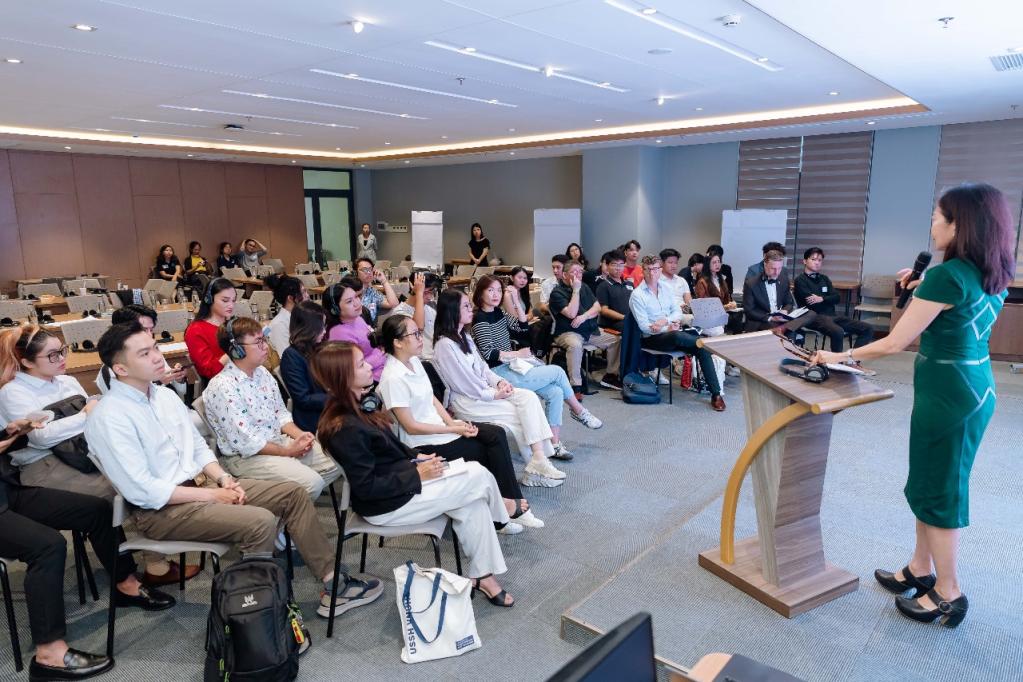
Press Release
30 May 2025
UN Women, UNICEF and UNFPA reaffirm commitment to support Ho Chi Minh City in providing essential services for women and children survivors of violence.
As Viet Nam’s dynamic socio-economic hub, Ho Chi Minh City has made significant development progress but continues to face persistent challenges related to gender inequality and violence against women and children. In response to this urgent need, and with technical and financial support from UN Women and other partners, the city launched its first One-Stop Service Center at Hung Vuong Hospital in March 2023. Since then, the Center has supported 224 women and adolescents affected by violence. During the same period, the hospital recorded more than 1000 cases of child mothers and adolescents seeking family planning services—none of whom accessed the Center’s services, for various reasons. These figures reflect a stark reality in Viet Nam. A 2019 national study conducted by Ministry of Home Affairs (formerly Ministry of Labour, Invalids and Social Affairs), the National Statistical Office of Viet Nam (formerly the General Statistics Office) and UNFPA revealed that two out of three women in Viet Nam have experienced physical and/or sexual violence by an intimate partner. Notably, 90 percent of survivors do not seek support from local authorities.Beside the Center at Hung Vuong Hospital, the UN agencies in Viet Nam have supported the development and piloting of various One-Stop Service models, such as Ánh Dương Houses, Peace House Shelters, and one at the National Children’s Hospital. These models provide integrated services for women and children survivors of abuse and GBV in Ho Chi Minh City, Ha Noi, Da Nang, Quang Ninh, and Thanh Hoa.The One-Stop Service models offer intake, assessment, treatment, and counseling for survivors of violence and abuse. These centers provide essential, free services in one location — enabling survivors to access medical care, psychological support, and legal counseling without navigating complex and fragmented systems.Representing the three UN agencies, Matt Jackson, UNFPA Representative in Viet Nam stated at the workshop:“Violence against women and children is not only a violation of rights — it is a hidden tax on development. It drains health systems, lowers workforce participation, limits human capital, and undermines peace and prosperity. If Viet Nam is to realize its full economic and social potential, ending violence must be a top priority. It is not a cost — it is a catalyst for sustainable, inclusive growth.”Speaking at the workshop, Nguyen Van Dung, Vice Chairperson of the Ho Chi Minh City People’s Committee, emphasized:"Given the prevalence and complexity of gender-based violence — occurring in households, schools, workplaces, public spaces, and online — no single agency or locality can address it alone. A coordinated, multi-sectoral approach is essential to deliver effective and lasting solutions.”Building on lessons learned, the Ho Chi Minh City People’s Committee has announced the establishment of three additional One-Stop Service Centers at Children’s Hospital 1, the City Children’s Hospital, and the Ho Chi Minh City Orthopedic and Trauma Hospital. During the launching ceremony of the three new models, representatives from UN Women, UNICEF, and UNFPA — under the Joint Programme on Ending Violence Against Women and Children, funded by the Government of Australia — reiterated their continued support to Ho Chi Minh City in expanding and strengthening these models. Their steadfast partnership brings additional resources, international expertise, and momentum to the City’s efforts in building a safe, inclusive, and violence-free environment for all women and children.-Ends-, filtered_html
1 of 5
Press Release
05 January 2025
United Nations Secretary-General’s Envoy on Technology to visit Viet Nam
This is the first country visit of Mr. Gill to Viet Nam since starting his role in June 2022 with the following objectives:To foster high-level discussions on digital transformation and AI governance, and Viet Nam’s initiatives in these emerging fields, including efforts to build a national innovation ecosystem; To deepen understanding and implementation of the Global Digital Compact, which provides a comprehensive framework for the global governance of digital technology and AI; andTo engage with multiple stakeholders, including youth, to better understand the needs of various segments of the Vietnamese society in inclusive digital transformation and ethical use of AI.During the 2-day visit hosted by the Viet Nam’s Ministry of Science and Technology (MOST), Under-Secretary-General Gill will have high-level meetings with leaders of the Government, the National Assembly, the Ho Chi Minh National Academy of Politics, line ministries, as well as serve as Key Note Speaker at the Multi-stakeholder dialogue on AI Governance (co-organized by MOST and the UN in Viet Nam) and the Youth-led dialogue on Digital transformation and AI Governance (organized by the UN in Viet Nam) with the participation of innovators, academics and students.The important visit of the Under-Secretary-General for Digital and Emerging Technologies and United Nations Secretary-General’s Envoy on Technology underscores Viet Nam’s growing role in the global AI conversation focusing on ethical AI deployment, governance, international collaboration, the role of the United Nations in shaping AI’s future, and the equality of opportunities in AI. ENDS*Mr. Amandeep Singh Gill was appointed United Nations Secretary-General's Envoy on Technology in June 2022 and serves as United Nations Under-Secretary-General for Digital and Emerging Technologies. In this role, he spearheads the Secretary-General's strategic initiatives in technology, facilitates coordination across the UN system and engages with a diverse array of stakeholders and partners globally. He is also a member of the Secretary-General's High Level Advisory Body on AI and of his Scientific Advisory Board. His extensive experience in technology and diplomacy includes serving as Executive Director and co-lead of the UN Secretary-General's High-Level Panel on Digital Cooperation (2018-2019) and as India's Ambassador and Permanent Representative to the Conference on Disarmament in Geneva (2016-2018). In recognition of his influential work in the field of artificial intelligence, TIME magazine named Mr. Gill one of the 100 most influential people in AI in 2024. , filtered_html
1 of 5
Press Release
20 November 2024
Launch of the National Action Month on Gender Equality and Gender-Based Violence Prevention & Response to 2024
On November 15, 2024, the Ministry of Labour, Invalids and Social Affairs (MOLISA), in collaboration with the Ministry of Public Security and the United Nations Entity for Gender Equality and the Empowerment of Women (UN Women), launched the 2024 National Action Month on Gender Equality and Gender-Based Violence Prevention and Response, under the theme: "Ensuring Social Welfare, Empowering and Enabling Women and Girls to Achieve Gender Equality and Eliminate Violence Against Women and Girls."The event was attended by Mr. Đào Ngọc Dung, Member of the Party Central Committee, Minister of Labour, Invalids and Social Affairs, and Chairperson of the National Committee for the Advancement of Women in Viet Nam; Lieutenant General Lê Văn Tuyến, Deputy Minister Public Security, Madame Pauline Tamesis, United Nations Resident Coordinator in Viet Nam; leaders of central ministries and agencies; representatives from provincial Departments of Labour, Invalids and Social Affairs; ambassadors; representatives of international organizations, the private sector; and over 800 delegates from the People's Public Security Forces.In recent years, the Party, State, and Government of Viet Nam have made significant efforts to ensure social welfare, promote gender equality, and prevent and respond to gender-based violence, particularly violence against women and children. Resolution No. 42-NQ/TW, dated November 24, 2023, from the 8th Plenary Session of the 13th Party Central Committee, emphasized that social policy must prioritize care for and empowerment of the people, centering the people as the core, driver, and resource for sustainable development.In his opening remarks, Minister Đào Ngọc Dung highlighted:
"Social welfare, measures to promote equality, and attention to the legitimate needs and interests of women and children must remain priorities. Under this year’s theme, the National Action Month emphasizes the importance of maintaining a stable, equitable, democratic society while ensuring social welfare, security, and safety for the people, especially for women and girls."This year's launch event spotlighted the involvement of the People's Public Security Forces, marking their commitment to gender equality and to gender-based violence prevention and response.Lieutenant General Lê Văn Tuyến underscored:
"The Ministry of Public Security has always directed the police forces at all levels to coordinate with relevant organizations in early detection, timely intervention, and proper handling of gender-based violence cases, illegal marriage brokerage, to protect victims and survivors. Alongside efforts to combat crimes against child abuse and human trafficking, these missions will continue to be a priority across the People's Public Security Forces."With concerted efforts from ministries, agencies, and local governments, gender equality in Viet Nam has achieved remarkable progress:The representation of women in Party committees across terms has increased.Women occupy key leadership roles in 59% of ministries and equivalent agencies.Women hold key leadership positions in 74.6% of provincial governments.Female representation in the 15th National Assembly stands at 30.26%, surpassing global and regional averages.The gender gap across education levels has narrowed.Support services for survivors of gender-based violence have expanded and improved in quality.Women’s roles in the economy have strengthened, with numerous female entrepreneurs and executives recognized globally.Additionally, Vietnamese female officers serving in UN peacekeeping missions have demonstrated the vital potential of women in addressing diverse challenges in the Women, Peace and Security agenda.According to the Global Gender Gap Report 2024 by the World Economic Forum, Viet Nam’s gender equality ranking rose to 72nd out of 146 countries, an 11-place improvement since 2022. On April 9, 2024, the UN Economic and Social Council (ECOSOC) elected Viet Nam to the Executive Board of UN Women for the 2025–2027 term, affirming Viet Nam’s growing stature on the international stage.Representing the UN in Viet Nam, Madame Pauline Tamesis, United Nations Resident Coordinator in Viet Nam stated: "The United Nations supports enhancing the capacity of the Vietnamese police in handling cases with sensitivity while ensuring that investigation processes are child-friendly, victim-friendly, gender-sensitive as well as gender responsive. Together, we have ensured that the police are fully equipped and trained to instill confidence and safety in women and children in reporting cases; and in seeking help from the authorities.”Despite significant progress, challenges persist. Gender stereotypes remain a major barrier, gender imbalances at birth are still high, and child marriage and adolescent pregnancy remain prevalent in ethnic minority areas. Violence against women and children continues, with women disproportionately bearing the burden of household and caregiving responsibilities. Emerging issues such as population aging, climate change and natural disasters have significantly impacted the socio-economic development process and people's lives, with women and children are among the most affected groups. Addressing these issues requires a comprehensive response from the entire political system and society at large. The formulation of policies and laws must go hand in hand with the responsibility and efforts of functional agencies in implementation to ensure that the laws are effectively applied in practice. Additionally, emphasis must be placed on the proactive and active roles of media agencies in changing traditional perceptions, gender stereotypes, and gender-based violence. More importantly, women and children themselves should also be proactive in sharing their experiences, seeking help to address issues of violence and abuse, and equipping themselves with the knowledge and skills to prevent these issues.Minister Đào Ngọc Dung called on all ministries, agencies, organizations, local governments, international partners, media, and every person to commit to practical and effective actions promoting gender equality for the prosperity and happiness of all individuals, families, and society.The National Action Month launch marked the start of a national communication campaign on gender equality and gender-based violence prevention & response. Following the ceremony, side events such as parades and martial arts demonstrations by the People’s Public Security Forces were held. Thousands of activities supporting the National Action Month are planned nationwide.The National Action Month for Gender Equality and Gender-Based Violence Prevention and Response is held annually from November 15 to December 15. All provinces, as well as many ministries and central agencies, have developed plans and implemented activities in response to this National Action Month. In 2023 alone, ministries, sectors, and localities carried out over 6,000 communication activities with more than 950,000 participants (of whom approximately 30% were men); nearly 480,000 communication materials were distributed; nearly 3,800 conferences, seminars, forums, and specialized discussions were organized; 57,683 news pieces and articles were produced and disseminated through mass media; and over 1.4 million leaflets and communication products were developed. It is estimated that the messages of the National Action Month have reached and engaged over 10 million people.For more information, please contact:
Gender Equality Department, Ministry of Labour, Invalids and Social Affairs
Address: 12 Ngo Quyen Street, Hoan Kiem District, Hanoi
Phone: +84 24 3825 3875
Email: vubdg@molisa.gov.vn , filtered_html
"Social welfare, measures to promote equality, and attention to the legitimate needs and interests of women and children must remain priorities. Under this year’s theme, the National Action Month emphasizes the importance of maintaining a stable, equitable, democratic society while ensuring social welfare, security, and safety for the people, especially for women and girls."This year's launch event spotlighted the involvement of the People's Public Security Forces, marking their commitment to gender equality and to gender-based violence prevention and response.Lieutenant General Lê Văn Tuyến underscored:
"The Ministry of Public Security has always directed the police forces at all levels to coordinate with relevant organizations in early detection, timely intervention, and proper handling of gender-based violence cases, illegal marriage brokerage, to protect victims and survivors. Alongside efforts to combat crimes against child abuse and human trafficking, these missions will continue to be a priority across the People's Public Security Forces."With concerted efforts from ministries, agencies, and local governments, gender equality in Viet Nam has achieved remarkable progress:The representation of women in Party committees across terms has increased.Women occupy key leadership roles in 59% of ministries and equivalent agencies.Women hold key leadership positions in 74.6% of provincial governments.Female representation in the 15th National Assembly stands at 30.26%, surpassing global and regional averages.The gender gap across education levels has narrowed.Support services for survivors of gender-based violence have expanded and improved in quality.Women’s roles in the economy have strengthened, with numerous female entrepreneurs and executives recognized globally.Additionally, Vietnamese female officers serving in UN peacekeeping missions have demonstrated the vital potential of women in addressing diverse challenges in the Women, Peace and Security agenda.According to the Global Gender Gap Report 2024 by the World Economic Forum, Viet Nam’s gender equality ranking rose to 72nd out of 146 countries, an 11-place improvement since 2022. On April 9, 2024, the UN Economic and Social Council (ECOSOC) elected Viet Nam to the Executive Board of UN Women for the 2025–2027 term, affirming Viet Nam’s growing stature on the international stage.Representing the UN in Viet Nam, Madame Pauline Tamesis, United Nations Resident Coordinator in Viet Nam stated: "The United Nations supports enhancing the capacity of the Vietnamese police in handling cases with sensitivity while ensuring that investigation processes are child-friendly, victim-friendly, gender-sensitive as well as gender responsive. Together, we have ensured that the police are fully equipped and trained to instill confidence and safety in women and children in reporting cases; and in seeking help from the authorities.”Despite significant progress, challenges persist. Gender stereotypes remain a major barrier, gender imbalances at birth are still high, and child marriage and adolescent pregnancy remain prevalent in ethnic minority areas. Violence against women and children continues, with women disproportionately bearing the burden of household and caregiving responsibilities. Emerging issues such as population aging, climate change and natural disasters have significantly impacted the socio-economic development process and people's lives, with women and children are among the most affected groups. Addressing these issues requires a comprehensive response from the entire political system and society at large. The formulation of policies and laws must go hand in hand with the responsibility and efforts of functional agencies in implementation to ensure that the laws are effectively applied in practice. Additionally, emphasis must be placed on the proactive and active roles of media agencies in changing traditional perceptions, gender stereotypes, and gender-based violence. More importantly, women and children themselves should also be proactive in sharing their experiences, seeking help to address issues of violence and abuse, and equipping themselves with the knowledge and skills to prevent these issues.Minister Đào Ngọc Dung called on all ministries, agencies, organizations, local governments, international partners, media, and every person to commit to practical and effective actions promoting gender equality for the prosperity and happiness of all individuals, families, and society.The National Action Month launch marked the start of a national communication campaign on gender equality and gender-based violence prevention & response. Following the ceremony, side events such as parades and martial arts demonstrations by the People’s Public Security Forces were held. Thousands of activities supporting the National Action Month are planned nationwide.The National Action Month for Gender Equality and Gender-Based Violence Prevention and Response is held annually from November 15 to December 15. All provinces, as well as many ministries and central agencies, have developed plans and implemented activities in response to this National Action Month. In 2023 alone, ministries, sectors, and localities carried out over 6,000 communication activities with more than 950,000 participants (of whom approximately 30% were men); nearly 480,000 communication materials were distributed; nearly 3,800 conferences, seminars, forums, and specialized discussions were organized; 57,683 news pieces and articles were produced and disseminated through mass media; and over 1.4 million leaflets and communication products were developed. It is estimated that the messages of the National Action Month have reached and engaged over 10 million people.For more information, please contact:
Gender Equality Department, Ministry of Labour, Invalids and Social Affairs
Address: 12 Ngo Quyen Street, Hoan Kiem District, Hanoi
Phone: +84 24 3825 3875
Email: vubdg@molisa.gov.vn , filtered_html
1 of 5
Press Release
06 November 2024
UN Women and Japan Join Forces to Support Women Facing Drought and Saltwater Intrusion in Ca Mau and Ninh Thuan
The “Water is Life” project, funded by the Government of Japan and led by UN Women in collaboration with the Women’s Unions of Ca Mau and Ninh Thuan, is a year-long project running from 2024 to 2025. By providing water storage tanks, filtration systems, efficient water-saving equipment, and targeted communication programs, this project aims to enhance women’s sustainable access to clean water, improve their livelihoods, and contribute to the prevention of gender-based violence in these provinces.“Women carry the primary responsibility for water collection and caregiving in their households, making them the first and hardest hit by water scarcity,” said Ms. Caroline Nyamayemombe, UN Women Representative in Viet Nam. “The ‘Water is Life’ project not only eases these burdens by securing vital water supplies but also empowers women in the frontline of building community resilience against climate impacts.” Due to water scarcity, women often spend an additional two to three hours each day collecting water, which affects their health, limits work opportunities, and increases their exposure to gender-based violence when traveling far from home. Additionally, a lack of clean water contributes to the spread of infectious diseases, especially impacting children, pregnant women and the elderly, and thereby increasing caregiving responsibilities.As part of this project, UN Women and the Government of Japan are providing water tanks to households and filtration systems to schools and health centers to improve sanitation for children and local residents. Furthermore, in alignment with the provinces’ development plans for water provision, this project is establishing linkages with private sector investors in water-saving technologies, with a commitment to empowering women, as the provinces continues to pursue long term solutions of this climate-induced issue. With the Government of Japan’s support, it is estimated that 7,200 people, especially vulnerable women, will benefit from these efforts.“We hope that this project will improve access to clean water for women and children living in Ca Mau, and that this will lead to the revitalization of agriculture and other industries, as well as securing livelihoods for women in vulnerable positions”, said Mr. Ito Naoki, the Ambassador of Japan to Viet Nam. NFrom November 5 through the end of December 2024, more than 420 women in Khanh Binh Tay Commune, Tran Van Thoi District, Ca Mau, will receive water storage tanks to help reduce time spent on water collection, lighten caregiving burdens, and protect family health. Additionally, 200 women in need of improved agricultural irrigation will receive financial support for water-saving irrigation equipment, following the declaration of a Level 2 drought emergency in Ca Mau. Facing severe drought, significant saltwater intrusion, and a heightened risk of wildfires, Ca Mau and Ninh Thuan are among Viet Nam’s most climate-vulnerable regions. Prolonged droughts are damaging agriculture and impacting the health and livelihoods of residents, particularly women and children responsible for household water supplies. In Ca Mau, saltwater intrusion in 2020 affected over 29,644 hectares of farmland, drastically reducing rice and vegetable yields and costing an estimated VND 107 billion. Rising water scarcity has forced over 20,000 households to buy water at high prices, affecting their ability to afford other essentials.In Ninh Thuan—the driest province in Viet Nam—prolonged droughts led to over 7,873 hectares of farmland being abandoned between 2019-2020. Here, the shortage of fresh water has placed 72,000 people at risk of food insecurity, while more than 12,000 households, encompassing nearly 50,000 people, lack access to drinking water. With surface and groundwater sources drying up, around 110,000 livestock have suffered malnutrition or died from lack of water and food., filtered_html
1 of 5
Press Release
06 November 2024
VIETNAM LAUNCHES THE FRIST NATIONAL PRESS AWARD FOR GENDER EQUALITY
The launching ceremony at the Center for Women and Development in Ha Noi welcomed leaders from the Viet Nam Women’s Union, UN Women, and the Viet Nam Journalists Association, alongside senior representatives from the Central Propaganda Department, the Ministry of Labor, Invalids and Social Affairs, and the Ministry of Information and Communications. Nearly 50 journalists and reporters from leading media outlets across the country attended. This award comes at a pivotal time when Viet Nam is steadfastly advancing its commitments to gender equality on the international stage. The National Press Award for Gender Equality seeks to honor journalists who are not only reporting the news but actively shaping a society that values and respects women and men equally. The Award will recognize exemplary contributions that promote gender equality and women’s empowerment, and work towards eradicating violence against women and children in Viet Nam.“Journalists are our change-makers, shaping public opinion and driving social progress,” said Caroline Nyamayemombe, Country Representative of UN Women in Viet Nam. “This award is about celebrating their power to inspire a future where gender equality is a reality for all.” Key Themes to Drive ProgressThe 2024 Award will shine a spotlight on three critical themes for gender equality in Viet Nam:Preventing Gender-Based Violence: Building a safer society by tackling violence against women and girls.Promoting Gender Equality in Digital Transformation: Ensuring inclusivity and equal opportunities as Viet Nam’s digital economy rapidly expands.Empowering Women in Economic Development: Recognizing women’s vital role in a dynamic, evolving economy.These themes reflect both the challenges and opportunities in Viet Nam’s journey towards gender equality, especially as the nation marks the 30th anniversary of the Beijing Platform for Action and the 10th anniversary of the Sustainable Development Goals (SDGs).Award Categories and TimelineThe Award welcomes entries across all media forms – print, online, radio, and television – for works published between January 1, 2022, and November 20, 2024. With a total prize exceeding VND 200 million, the award will honor outstanding works across Categories A, B, C, and special commendations, celebrating the dedication and skill of 26 individuals and teams.Organizers anticipate over 300 high-quality submissions, especially those highlighting Viet Nam's progress in gender equality and women’s empowerment. Through this initiative, the Viet Nam Women’s Union and UN Women aim to amplify messages that promote equality, foster positive public perceptions, and inspire actions for a gender-equal society.Submission DetailsEntries are open from November 1, 2024, to November 20, 2024. Information about the Award and submission guidelines will be widely available through the Viet Nam Women’s Union, UN Women, and national media outlets. , filtered_html
1 of 5
Latest Resources
1 / 11
Resources
25 October 2024
Resources
23 October 2024
Resources
24 September 2024
Resources
18 September 2024
Resources
14 September 2024
1 / 11

